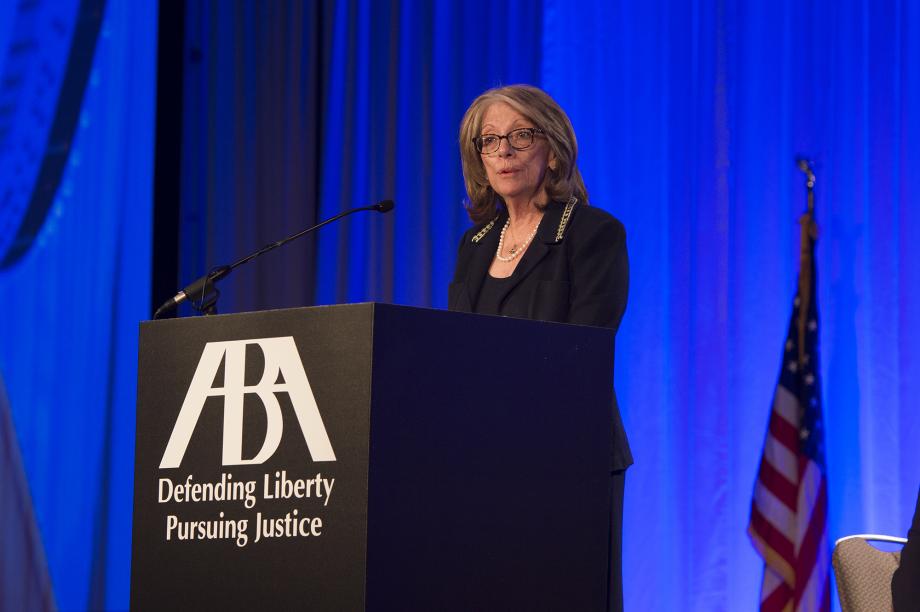Roberta Cooper Ramo, ’67, Accepts ABA’s Top Honor

As Albuquerque lawyer Roberta Cooper Ramo, ’67, accepted the American Bar Association’s highest honor Saturday—an award that has been given to US Supreme Court Justices, celebrated legal scholars, and other influential leaders—she acknowledged three people who inspired her along the way, including Phil Neal, dean of the Law School when she attended.
The first woman ABA president in 1995, Ramo is also the first woman elected president of the American Law Institute and the only person to have led both organizations. She was a trailblazer in the use of technology in law practice, and helped found what is now the Law Practice Division at the ABA. A champion for judicial independence and adequate funding for legal aid, Ramo also was the force behind the creation of the ABA Commission on Domestic Violence.
“The ABA Medal is bestowed for ‘exceptionally distinguished service by a lawyer or lawyers to the cause of American jurisprudence,’” said Interim Dean Geoffrey R. Stone, the Edward H. Levi Distinguished Service Professor of Law. “Past recipients include Oliver Wendell Holmes, John Henry Wigmore, Roscoe Pound, Charles Evans Hughes, Felix Frankfurter, Thurgood Marshall, and Ruth Bader Ginsburg. It's a big deal. Not bad company.”
Ramo, whom ABA President William C. Hubbard called “truly a Renaissance woman,” graduated from the Law School at a time when few other law schools admitted women, and few law firms hired them. But she had the support of several champions who helped her break through barriers. Among them was Neal, who played a pivotal role in helping her launch her career.
“In 1967 when I couldn't find anyone who would even answer my letters as (my husband and I) were about to move to North Carolina … the dean called me in to find out why I didn’t have a job,” she said. “When I explained, without hesitation and with me sitting right there, he picked up the phone and called (former North Carolina) Gov. Terry Sanford, who just stepped down from the governorship. He demanded that Gov. Sanford personally take on the job of finding me some place to work, posthaste. And out of fear of Phil Neal, he did.” She joined a foundation working to end racial discrimination and poverty.
Ramo also acknowledged the mother of golfer Nancy Lopez, who retained Ramo to figure out how her then-high school phenom could play on the boys golf team, and Martin Luther King Jr., whom Ramo saw with a crowd gathered around him in a kitchen in Chicago in 1966. In town to organize for voting rights, Ramo heard King tell the gathering not to despair, that the lawyers and Constitution were on their side and that the lawyers would make sure that the Supreme Court heard them. “Suddenly, I understood the power of listening, the power of the American lawyer, and the power of the American justice system to right the deepest wrongs,” Ramo said.
Hubbard said that Ramo—who said she shared the medal with every lawyer and judge in the room—had “left her mark on not only the ABA, but the entire legal profession and indeed our nation and our world.”
“Throughout her career,” Hubbard said, “she has distinguished herself on every issue on which she focused: domestic violence, judicial independence, gender equity, public understanding of the law, and the advancement of fair and equitable legal systems across the globe, and countless others.”
Contributing: American Bar Association